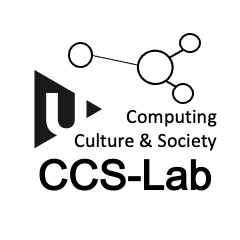CCS-Lab at the University of West Bohemia invite you to a third series of lectures, workshops, and seminars:
Computing Culture & Society: Applications and Reflections
rationale: Today, computer technologies have a transformative impact on the way we conduct research across the academy, including humanities and social sciences (HaSS). However, to produce really novel insights, it appears that the computational approaches to culture and society require collaboration of experts across the whole spectrum of academic disciplines. Around the globe, we observe an emergence of new specialized research centers designed to facilitate such transdisciplinary collaboration. Some of these centers will be introduced in the lectures by international guests. In the seminars, researchers from two faculties and four departments at the University of West Bohemia (UWB) will discuss their research within this scope to receive feedback from scholars with a different academic background or to enhance potential future collaborations.
format: All events are available to the public and will be held in a hybrid format, with an opportunity to decide either for a physical attendance or to connect virtually via ZOOM. The international guests will connect virtually.
location: RJ 209, Sedláčkova 19, Plzeň
zoom link for the lectures: https://cesnet.zoom.us/j/93139477086
contact person: Vojtěch Kaše (Department of Philosophy, UWB, kase@kfi.zcu.cz, 773205608)
Friday, February 24
WORKSHOP:
11:00-12:30 -A practical, hands-on workshop: Introduction to Zotero
Friday, March 17
WORKSHOP:
10:00-19:00 –Machine Modeling of Philosophical Text (in Czech)
Friday, March 24
LECTURE:
11:00 – Nicolas Baumard (Ecole Normale Supérieure – PSL University), Cognitive fossils: How literature, music and the arts can be used to recover individual preferences in history
annotation: Psychology is key to understanding human history. Changes in people’s preferences have been shown to lead to important changes in institutions, social norms, and cultures. However, the role of psychology in shaping human history has been underestimated and understudied because of the difficulty of studying the thoughts and preferences of people who are no longer alive. Recent developments in psychology suggest that cultural artifacts reflect, in part, the preferences of the individuals who produced or consumed them. These results can now be combined with new methods in computational sciences. Specifically, text mining methods have facilitated the quantification of emotions and personality trait in contemporary material (e.g., newspapers, social media); face detection algorithms have enabled the automated extraction of emotions; automatic extraction of melodic information from music scores and audio records have allowed to quantify the emotional content of thousands of contemporary songs. Cultural artifacts can thus serve as “cognitive fossils,” i.e., physical imprints of cognitive mechanisms that no longer exist.I will present three case studies: love, imaginary worlds and parental affection.
Friday, April 21
LECTURE:
11:00 – Yann Ryan (University of Helsinki & University of London), Big data, High Performance Computing, and the Scottish Enlightenment: the Helsinki Computational History Group
annotation: For the past decade, the Computational History Group (COMHIS) at the University of Helsinki have been applying quantitative methods to the study of the past, work which is in the midst of being transformed by the use of High Performance Computing (HPC), allowing us to ask entirely new types of questions of our data. In this talk I will outline some of the current research strands of the group, and how I see them contributing to our wider research goals. I’ll introduce some case studies concerning our key research focus: eighteenth century intellectual history and the Scottish Enlightnment, through the analysis of the digitised books from Eighteenth Century Collections Online (ECCO). I’ll also share some thoughts on the new opportunities and research possibilities unlocked by HPC and the latest ‘large language models’.
